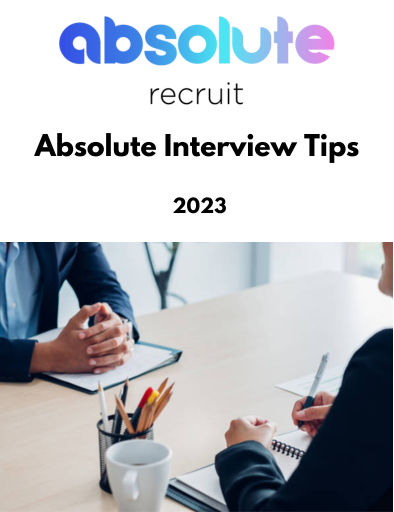




You have been invited for an interview and taken that step towards securing a new role, but what now?
In a market where competition for desirable roles is high, the process can be daunting and uncomfortable. The question is, how can distinguish yourself from others?
Daily, Absolute Recruit advises candidates and clients on interview processes and preparation. Even the most versed will tell you, interview preparation is the key contributor to a positive outcome. To quote Benjamin Franklin, ” By failing to prepare, you are preparing to fail”.
It is also important to remember, that whilst you are being interviewed, this is also an excellent opportunity to assess if the company, culture & opportunity are the right fit got you!
When conducting your preparation, we always suggest using the S.T.A.R methodology: SITUATION | TASK | ACTION | RESULT.
Whether a virtual, face-to-face or competency-based interview, we have outlined some key tips to successfully navigate the interview process.
An obvious tip, but often only carried out on a superficial level. Doing your homework on the employer should always be your starting point and you should ask three key questions: What do they do? Why do they do it? and how do they do it?
Don’t just use their website as a source. The benefit of modern technology is everything is at your fingertips, so utilise it! Read external articles and news clips, review their LinkedIn and recent content, explore Glassdoor & Google reviews, companies’ house, analysis individual employees and their career development and personal posts. Gathering information at this stage will enable you to formulate how you present yourself, and the questions you ask, and help you traverse the interview.
In addition to the company, it is worth conducting further research on the relevant industry and competitors. What challenges are present in the industry, does the industry come with specific nuances? Equally, how do they compare to competitors, are they better or worse, perhaps this initiates a topical conversation and provokes questions.
Whether face-to-face or video do not underestimate first impressions!
Be Early! If face-to-face check where you are going in advance, check transport times & links. If a video call, check your internet connection and be ready in the virtual waiting room – don’t leave anyone waiting!
Dress to impress! Being suited & booted is not really the done thing in 2023, but that doesn’t mean you should not be smart and presentable. If you join the organisation, you will act as an extension of the company, how you present yourself matters!
Check your surroundings. More relevant to video interviews, check your surroundings, find a neutral backdrop, avoid background mess, set up in a private and quiet space and put your phone on silent!
Eye Contact & Solid handshake. Don’t underestimate the power of body language. A solid handshake and continual eye contact portray confidence in yourself and will be noticed by the interviewer.
If on a video call, avoid the temptation of distraction. Shut down your email and give 100% of your attention to the interview and remember, look at the camera.
Be polite! Be warm and polite to everyone you meet. The receptionist may not be your boss, but she can certainly provide feedback on your conduct when sitting in the waiting room. Niceties go a long way and will be remembered.
Being able to articulate this is important, and typically we find there are multiple reasons someone is looking to move on. Providing formulated and considered answers is the way to go, giving superficial & ambiguous responses will raise doubts and typically create more questions than answers. Give details and facts to substantiate your statements, don’t leave things to assumption.
Never bad mouth your previous employer! Your last boss may have been poor, but slander and deformation reflect worse on you in this instance; be respectful and positive about your current employer.
If you are immediately available, have gaps in your CV or have been out of work for some time, it will come up in conversation! Post-pandemic, clients are forgiving on CV gaps, redundancies or leaving jobs, but you must still be prepared to discuss it. During these periods did you try to upskill or invest in self-development? For good or bad, it is important you can talk through all parts of your CV and provide justification with conviction. Saying nothing can often lead to the wrong conclusions being made.
Arguably the most important element of the interview! Can you succinctly articulate your relevant skills in comparison to the requirements? We always recommend thinking about examples for each bullet point on the job specification; do you have associated real life facts & figures to substantiate your relevancy? If not, don’t panic, think about your transferable skills and how you can utilise them!
It is crucial to carefully review and analyse the job description to ensure that you have a clear understanding of what the company is seeking in their prospective employee. The better comprehension you have of the interviewer’s requirements, the better equipped you will be to provide responses that meet or even surpass their expectations.
Significant achievements are your USP and differentiator. You have to assume everyone interviewing for the position has the relevant skills, but that does not mean they have the same success and achievements. It is these examples that will separate you from the crowd and not only highlight your relevant skills and knowledge but demonstrate how you utilise your skills to add value to an organisation. Facts and figures are critical when discussing this!
This always proves to be a challenging question to answer, let’s be honest, why would you want to expose a weakness?
Whilst a challenge, the reality is, if you can already carry out 100% of the role, why would the role appeal to you? One of the reasons you might be interested in the role is because there is the opportunity to gain exposure to new responsibilities, new environments, new challenges and ultimately elevate your skillset.
Rather than addressing these as “weaknesses” present them as “areas for development”. Highlight how your transferable skills will enable you to carry out the new aspects of the role and how this is just one of the things that excite you about the opportunity.
You can leverage this question to really emphasise your interest in the role and explain why previously you have not managed to gain exposure to this, an example of this could be as simple as working in a different industry that does not share the same requirements.
Don’t leave any stone unturned! Very simply, put yourself in the interviewer’s shoes and think about what questions you would have about yourself. Are there any areas in your CV that would raise questions or need further context & detail?
The client doesn’t just want to know about your skill set, they want to know about the individual behind the piece of paper. Don’t be generic, what have you done historically to develop yourself? Think about personal achievements outside your professional capacity, whether it is Charity or sporting achievements, it all speaks to your character and values.
There is no doubt whether at the beginning of your career or entering your last chapter, interviews can be uncomfortable. It is worth remembering that you secured the interview based on the information the employer has been provided with, you have earnt the right to be there! Be confident in your ability, your skills and don’t rush your answers.
Taking a brief pause to collect your thoughts before answering is not only acceptable but also advisable. It will prevent “waffling” and allow you to respond with concise yet informative answers.
The majority of candidates we speak to often fear “over-selling” themselves, they do not want to portray themselves as egotistical. It is hard to strike the right balance, but no one can sell themselves better than you! There is a big difference between confidence and arrogance, but there is nothing wrong with showcasing you are the ideal candidate for the job.
It is imperative to ask some questions to demonstrate you have done some research, you are curious and that you have a serious interest in the position. Even if the interviewer has been detailed in the information provided, still ask questions!
We recommend writing a list of questions whilst conducting your research. Your questions should be targeted across three areas: The Business, The Role, and The Person. Some examples could include:
Throughout the interview, you must pay attention and remain focused. You may pick up on some critical information, it could highlight a red flag or even answer a question you planned on asking.
The ability to listen, retain and act on information will likely form a large part of your role and play a major part in the selection process. Listening and retaining information is also the biggest indication of your interest in the opportunity. If you unable to demonstrate the skill of listening, it is unlikely you will move forward to the next stage.
Finally, thank the interviewer for their time and emphasis your interest in the opportunity (if applicable).
The above information is not a one-size-fits-all, there will of course be individual circumstances that will require alternative approaches. In addition, there are no guarantees and even if you prepare properly there are no certainties, but it will help. Like any learned skill you may not get it right the first time, it takes practice, trial & error.
For more interview advice, to register or to discuss your hiring needs please contact us on: info@absolute-recruit.com